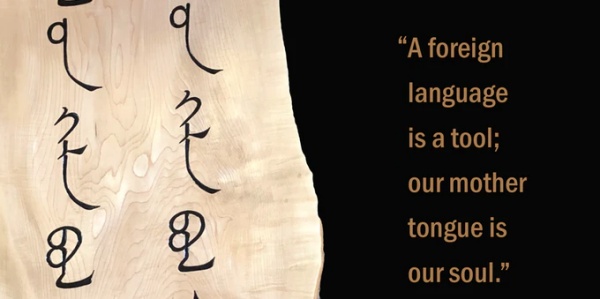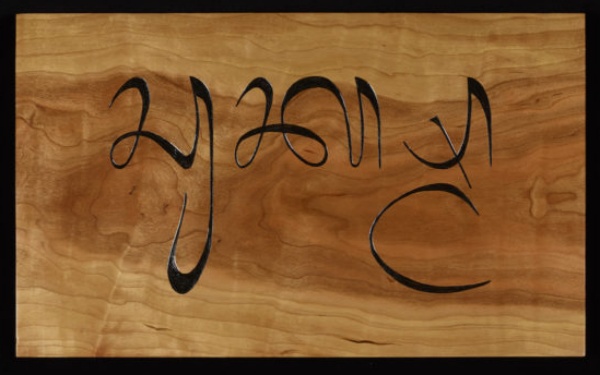How do you make ALL mother tongues digital?
Language is much more than a tool, and we think too little about it.
“A foreign language is a tool; our mother tongue is our soul”.
So says the Southern Mongolian Human Rights Information Center, and this is how that statement looks, written in the Bichig script of the Mongols:

<u><em><strong>CAPTION:</strong>
<a href="/img/bichig-mongolian-script.png" target="_blank">DO click for full picture!</a>
</em></u>
As far languages and writing are concerned, a script is the set of written symbols of a certain language. Ignoring numbers and puntuation for simplicity, we may say that English uses a script of 26 symbols (A..Z), that you obviously know, if you are reading this post.
Of course,the concept is valid for every language and its native speakers, even if most of us never stop to realize it.
Mongols, however, have many more reasons than others to feel and make that point so explicitly. Today, the only place where that ancient script of theirs is still regularly used is the Chinese province of Inner Mongolia, but this will probably change soon, and not in the good way.
A few months ago, in fact, the chinese government announced that the Mongols living in Inner Mongolia will have to learn, speak, and write Chinese. The fear, also looking at Uyghurs and Hong Kong, is that the next steps will include a serious erasure, or rewriting, of the entire history of the Mongol people.
This development in China is the reason why Tim Brookes, founder of the Endangered Alphabets Project, launched on Kickstarter ULUS, Ulus is a board game that celebrates Mongolian culture and aims to revive and preserve the Bichig script.
Bichig is only one of the many scripts that Brookes and his projects work to preserve. You can find many more fascinating examples of how important his work is in the interview I am quoting here, and in an article he wrote in 2013, “Save a Language, Save a Culture”.
An alphabet is a weapon
Brookes says:
[For about a century] “there has been this belief that first of all, alphabetical systems are superior to ideographic or pictographic systems - more advanced and more suitable for abstract thought."
“And secondly, along with that has been the notion that the ideal writing system is one that does nothing but represent the sounds of spoken language."
But “the Latin alphabet is dominant in much of the world and completely dominant in things like computer coding… not because it’s the best alphabet, even for English”, but simply because it was the one of the people with “the most lawyers, guns and money."
The third assertion is obvious. As a “direct descendent” (please do note the quotes, and don’t make a big deal out of them, really), of the original inventors and “promoters” of tha alphabet, the other two really, literally hit close to home.
The second may be something that probably most Italians, me included, instinctively consider natural, and right, more than any other pepople. We regularly find surprising how foreigners cannot just “pronounce what they write as they write it, like we do”. Our own regional dialects, that sometimes sound more alien than Martian even to us, do not even start to scratch this certainty.
The first… Me, I have no idea if non alphabetical systems would be more or less suitable for abstract thought. Surely, I do not believe that alphabets are intrinsically, always more advanced. I would dare say more flexible, or at least easier to port to new technologies. Which doesn’t mean superior.
What about digitization?
Quoting Brookes again:
“Writing systems do much more than simply represent speech. They create historical archives and artefacts of peoples, places and time as much as they create operational, empowering resources of communication and agency."
“The protection and revitalisation of endangered writing systems is a distinctly pertinent human rights issue”.
There are many other reasons why the work Brookes and his partners are doing is crucial. Read the link above to learn them, it’s fascinating.
Personally, I am fascinated also by a serious issue that all that work raises, and for which I do not have any usable answer yet. Something that is hard to handle, because it is unavoidably tied to the domination and assimilation that rightly concern Brookes.
Our (for lack of a better term) civilization is at a point where digital technologies, and above all digital communication and digital management and preservation ofhistory and culture, are here to stay. Unless we destroy ourselves first, with the same technologies, of course.
Computers and the Internet have already done more than anything before to push minority languages in the darkness, and show no signs of slowing. But the same tools can also be the best allies for whoever wants to speak, write, preserve and protect the same languages, and their scripts. All it takes to destroy forever a unique parchment, or a warehouse of paper textbooks, is one lighter. But if that parchment and books are digitized, it will be infinitely easier to learn, share and preserve their treasure.
The big problems are:
- how to do this without losing, or altering, more than it is absolutely necessary?
- how to make this goal compatible with the need, which I consider equally important, to also have one “lingua franca” for the whole world?
Thank you (in Balinese),

for sharing any thought on these matters.
Who writes this, why, and how to help
I am Marco Fioretti, tech writer and aspiring polymath doing human-digital research and popularization.
I do it because YOUR civil rights and the quality of YOUR life depend every year more on how software is used AROUND you.
To this end, I have already shared more than a million words on this blog, without any paywall or user tracking, and am sharing the next million through a newsletter, also without any paywall.
The more direct support I get, the more I can continue to inform for free parents, teachers, decision makers, and everybody else who should know more stuff like this. You can support me with paid subscriptions to my newsletter, donations via PayPal (mfioretti@nexaima.net) or LiberaPay, or in any of the other ways listed here.THANKS for your support!